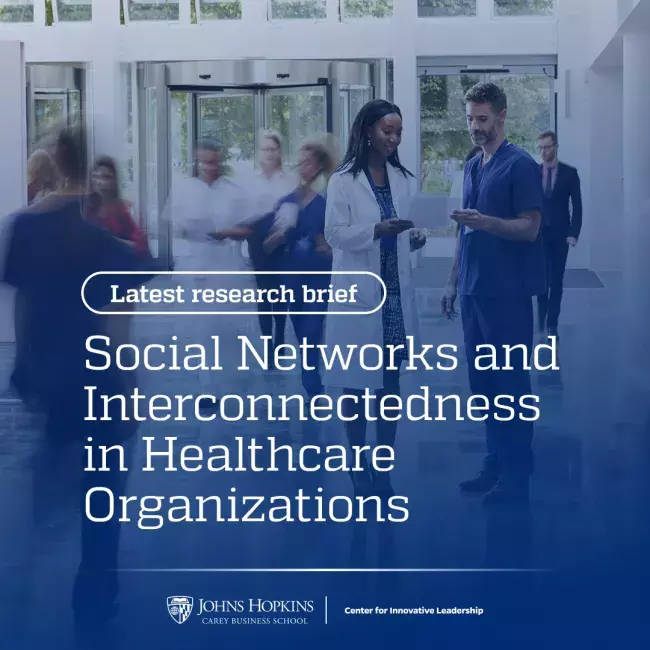Healthcare leaders should be aware of the pros, cons, and sometimes surprising nuances around different types of social networks in healthcare organizations.

Understanding the Nuances of Social Networks and Interconnectedness in Healthcare Organizations
Summary: Employee well-being, job satisfaction, and engagement are essential prerequisites for a healthy, high-performing workplace. Nowhere is this more important than in healthcare, where satisfied and engaged workers deliver high quality care and contribute to the collective functioning of the healthcare system. By contrast, over-stressed, burnt out, or disengaged workers bring absenteeism, staff turnover, increased likelihood of medical errors, and decreased patient satisfaction.
While the role of workplace relationships in supporting well-being at work, including the importance of social networks, is becoming better understood, previous research in this area has often been one-dimensional. Not all social networks are equal. They can vary in strength, intensity and influence. Being embedded in a highly-connected social network focused on the transfer of rich, job-related, advice and information can be beneficial to well-being. Conversely, occupying a prominent role in a social network focused on social support can sometimes be less so, and even have a detrimental effect on well-being.
Most healthcare workers interact in a mix of both types of networks, and for managers looking to increase job satisfaction and workplace performance it is important to understand these dynamics and to consider both the positive and lesser known negative effects of social networks on well-being.
In recent years, the study and practice of improving organizational performance has moved beyond redesigning and restructuring systems and procedures, and embraced the critical importance of human behavior to productivity. Today, ensuring the engagement and positive well-being of the workforce is seen as key to unlocking high-performance.
Understanding the forces that determine employee well-being and engagement, and that minimize stress, burnout and disaffection is important for all team managers. In hospitals and primary healthcare environments, where team performance underpins the functioning and improvement of healthcare systems, it is essential.
It is well understood that the quality of an individual’s workplace relationships and social networks are key factors in supporting well-being. For example, support from colleagues can mitigate work stress and being well-connected at work can promote job satisfaction. However, this simple view does not acknowledge how varied different types of social networks and relationships between colleagues can be.
A recent study from Christina Yuan, Faculty Affiliate at the Center for Innovative Leadership at Johns Hopkins Carey Business School, in collaboration with Alden Lai, Lauren Benishek, Jill Marsteller, Darshan Mahabare, Hadi Kharrazi, and Sydney Dy, throws light on the nuanced dynamics of workplace relationships and social networks, and explains how their influence on the well-being of healthcare workers is not uniform, but can have both positive and negative effects.
Yuan’s study is one of very few to examine whether health care workers’ social ties affect their job satisfaction. The study empirically investigates how two different types of workplace relationships—instrumental and expressive ties—influence job satisfaction and well-being. Instrumental relationships are primarily focused on the transfer of job-related advice and information. Expressive ties are more personal and are characterized by friendship, compassion, and social support. The researchers also considered the influence of two key properties of social networks on job satisfaction—centrality and density. A network’s centrality is a measure of the importance of the individual in a network, while network density is a measure of the cohesiveness of an individual’s network.
Improving the well-being of health care professionals is not only good for the individuals, and for team performance, but the consequences of worker dissatisfaction can be disastrous. Both theory and practice suggest that workplace relationships play a vital role in shaping perceptions of well-being, enabling resource exchange, sense of social embeddedness, enabling learning, and protecting against stress and burnout. They can foster feelings that work is meaningful—one of the most common conceptualizations of workers’ happiness or well-being.
Grounded in Social Network Theory, Yuan’s study analyzed how these different types of workplace relationships contribute to job satisfaction, focusing on the role of respondent’s density in the instrumental network and centrality in the expressive network.
Surprising findings
First, contrary to the researchers’ expectations, they found that the density or cohesiveness of health care workers’ instrumental ties contributed far more to their ratings of job satisfaction than occupying a central position. Density of social networks, by promoting reciprocity, trust, and shared norms, is important in instrumental networks because it breeds confidence in the quality of information and guidance exchanged, helping improve the quality of one’s work, and enhancing job satisfaction.
Secondly, with expressive ties, the study found that density had no effect, whereas network centrality was significantly associated with job satisfaction—but in a negative way. They contend that prominent individuals in an expressive network may experience lower levels of job satisfaction because they are more likely to engage in emotional labor that contributes to emotional exhaustion. Central individuals tend to be responsible for managing the dynamics among other healthcare workers, such as a manager who finds themself mediating tensions between two other workers. These responsibilities and the emotional labor they require can undermine job satisfaction.
Practical implications
For healthcare leaders seeking to improve performance and patient outcomes through enhancing workers’ well-being, job satisfaction is a key measure. Yuan’s study reveals how job satisfaction can be improved by considering workers’ position in instrumental and expressive social networks.
Workers’ job satisfaction and sense of well-being can benefit from greater access to information, advice, and guidance, as well as from help and resources to regulate emotionally exhausting network connections. To promote healthy social networks in the workplace, leaders should act to cultivate a sense of teamwork in which asking for and providing information and emotional support is both encouraged, modeled, and rewarded.
While awareness of this issue is of critical importance in healthcare settings where the damage caused by dissatisfied, disengaged staff can be serious, these are important lessons to be learned for team leaders in all organizations.
The Center for Innovative Leadership (CIL) at the Carey Business School aims to advance knowledge and build capacity for innovative leadership in modern organizations. CIL is a hub for new ideas and insights on leadership, combining faculty-led research, student-facing programming, and community-focused impact.


